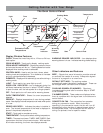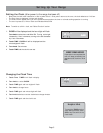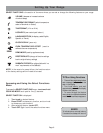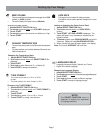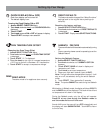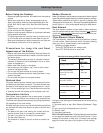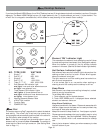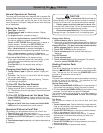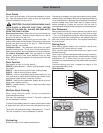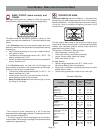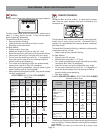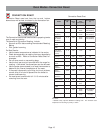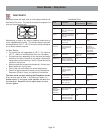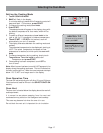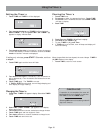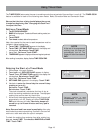
Page 12
Oven Features
CAUTION: TO AVOID POSSIBLE BURNS, PLACE
OVEN RACKS IN DESIRED POSITIONS BEFORE
TURNING THE OVEN ON. ALWAYS USE OVEN MITTS
WHEN THE OVEN IS WARM.
Removing from oven: Grasp rack firmly on both sides and
pull rack toward you. When the stop is reached, tilt rack up
and pull the rest of the way out.
Replacing in oven: Grasp rack firmly on both sides. Tilt
rack up to allow stop into rack holder. Bring rack to a horizontal
position and push the rest of the way in. Rack should be
straight and flat, not crooked.
Telescopic Rack: The telescopic rack allows for easier
access to cooking food. To use, pull out both sections first.
When stop is reached, pull out top section until stop is reached.
To remove telescopic rack, with top section in closed
position, grasp entire rack (both sections) firmly on both
sides. When the stop is reached, tilt rack up and pull the rest
of the way out.
Multiple Rack Cooking
When using multiple racks, follow the placement
recommendations below.
Two rack: Use rack positions 2 and 5. The rack in position 2
can be telescopic if desired.
To allow for best baking results for cakes, place items on back
of upper rack and front of lower rack (see graphic at right).
Three rack: (for convection bake): Use positions 1, 3 and 6.
The rack in position 3 can be telescopic if desired.
Preheating is necessary for good results when baking cakes,
cookies, pastry and breads. When using the probe preheating
is not recommended. Setting a higher temperature does not
shorten preheat time. Place oven racks in proper position
before preheating. A beep will confirm that the oven is
preheated and the selected oven temperature will be displayed.
Pan Placement
Baking results are better if pans are placed in the center of the
oven. If baking more than one pan on a rack, allow at least
1" to 1 ½” of air space around the pan. When baking four cake
layers at the same time, place pans on two racks so that one
pan is not directly above the other. Do not place food directly
on oven bottom.
Baking Pans
Glass baking dishes absorb heat, therefore reduce oven
temperature 25°F when baking in glass.
Shiny, smooth metal reflects heat resulting in lighter, more
delicate browning.
Dark, rough or dull pans will absorb heat resulting in browner,
crisper crust. Some manufacturers recommended reducing
temperature 25° F when using this type of pan. Follow
manufacturer recommendations. Use glass or dark metal pans
for pies.
Insulated baking pans may increase the length of the
recommended baking time.
Preheating
Preheat the oven if the recipe recommends it.
Rack Position
(see graphic at right for further details)
RACK 6 (highest position) – Use for melting cheese, broiling
thin foods
RACK 5 – Use for broiling most meats, toasting bread
RACK 4 – Use for broiling thicker meats
RACK 3 – Use for most baked goods when baking on one
rack, such as on a cookie sheet or baking pan, cakes, frozen
convenience foods, biscuits, brownies, muffins
RACK 2 – Used for pies, casseroles, breads, bundt or pound
cakes, small roasts or poultry,
RACK 1 (lowest position) – Use for angel food cake, large
roasts, turkey.
Oven Racks
Your oven has three racks: 2 flat and one telescopic or three
flat. They are designed with a stop so they will stop before
coming completely out and not tilt.
Multiple Rack Cooking - Pan Placement
One Rack
Two Racks
6
5
4
3
2
1
Rack Position



